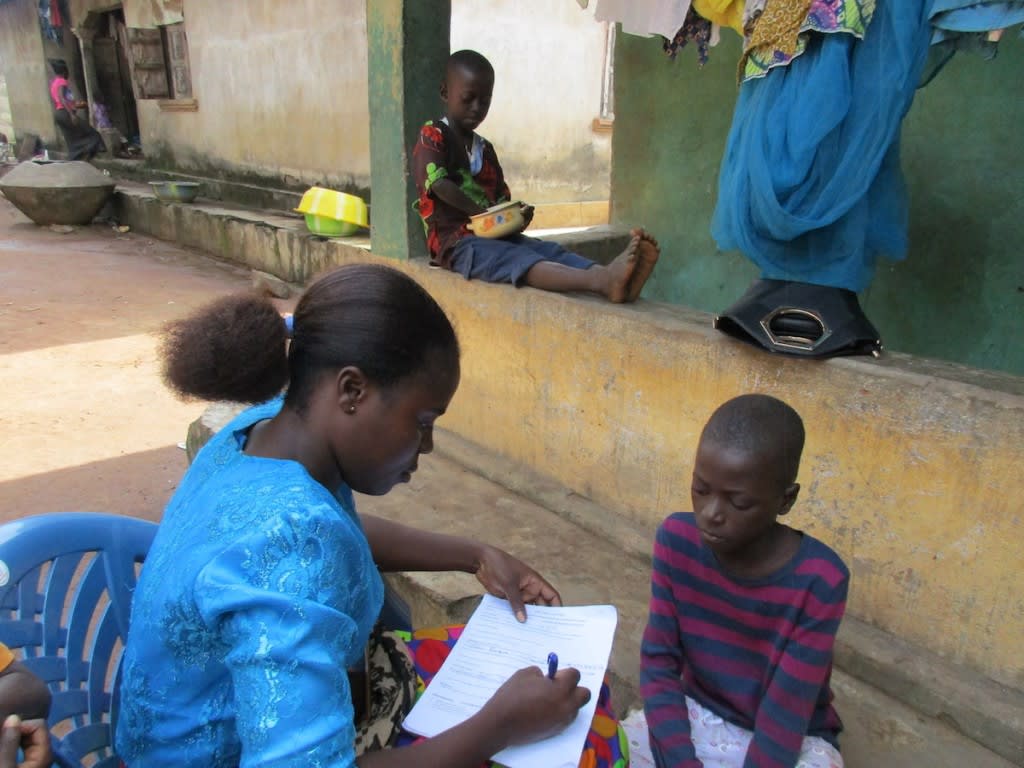Ebola’s Impact
Ebola has been a tragic reality for the people of Sierra Leone over the last two years. Though considered stable at the moment, the country is still very cautious.
Our teams have remained safe and are on the front lines of Ebola prevention through this water, hygiene and sanitation program. Your support acknowledges and celebrates their selfless work and bravery.
The entire team continues to express their gratitude for your support of communities in Sierra Leone, and we can’t wait to celebrate safe water together!
Please enjoy the following report comes straight from the field, edited for clarity and readability:
Welcome to the Community
Main Motor Road runs through Pewullay, Sierra Leone. Pewullay is a coastal community full of fishermen. Being a fisherman is unpredictable. One minute asleep, the next minute rushing to the wharf to seize news about good catches. They know the day, months, and seasons when each kind of fish can be caught. These lessons and fishing techniques are passed down generation to generation. If it's not fishing, it's farming, but fishing is so important here that prayers and funerals are put on hold until the fish are brought to shore! While men focus on these tasks, women and children take on the brunt of domestic work. From an early age, children become accustomed to carrying buckets of water on their heads weighing 20 pounds or more!
Pewullay is home to approximately 1947 people. (Editor's Note: While this many people may have access on any given day, realistically a single water source can only support a population of 350-500 people. This community would be a good candidate for a second project in the future so adequate water is available. To learn more, click here.)
Water Situation
Water is fetched from a scoop hole dug in the sand at the base of a cliff. Descending the cliff is a feat in itself; it is very steep and slippery, and shoes must be removed to make it down safely. At the bottom, dirt and rubbish is cleared away and a hole is dug in the sand. The water that pours into this hole might look clean with the naked eye, but once poured into a glass it looks completely different.
The process of fetching water puts people in danger. There have been two deaths reported from landslides near the water source. Apart from this, the water itself threatens the health of the community. People often suffer from typhoid, cholera, diarrhea, and skin rashes.
Water scarcity is a huge issue. Women and children only fetch enough water for drinking, sacrificing personal and environmental hygiene. Any other water is found in containers left out to collect the rain.
Sanitation Situation
Under half of households had a pit latrine at the time of our initial visit. The pits are sandy and shallow with timber stretching across for floors. Palm leaves are normally used for walls and roofing, and cloth is hung for a door. Since only part of the population has a latrine, open defecation is a big issue. Our team has already made door to door calls to inform people of the dangers open defecation brings. For this community in particular, we've asked that each household have some type of latrine before we start borehole construction.
Not even a quarter of households surveyed have a hand-washing station, dish rack, or clothesline. These tools are easy to construct, but make a huge difference in preventing the spread of germs. A majority of people just dispose of their garbage behind their kitchen, which attracts clouds of flies that further spread germs from one thing to another. We included pictures of the facilities we could find under the "See Photos & Video" tab.
Plans: Hygiene and Sanitation Training
Training will be offered to the community for three days. At least one representative of each household is required to attend. The facilitator will use the PHAST (Participatory Hygiene and Sanitation Training) method to teach participants how to make their own hand-washing stations, wash hands, construct proper latrines, and many other topics. By the end of training, each household that participated will have their own hand-washing station.
Plans: New Borehole
This well will be drilled at #40 Main Motor Road, making it the second of two boreholes in this huge community. At the start of our relationship with this community, we had proposed one new well but later realized that wouldn't be enough.
After discussions with local leaders, we decided that #40 Main Motor Road would be a great location convenient to hundreds in this area.
Locals will form a water user committee that oversees and maintains the new well. When construction is finished, we will hand over the borehole to the committee and residents of Pewullay. If there are ever any issues with the pump, the committee will reach out to our team so we can make repairs.

 Borehole Well and Hand Pump
Borehole Well and Hand Pump
 Rehabilitation Project
Rehabilitation Project






















